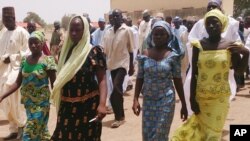ABUJA —
Nearly 200 teenage girls in Nigeria have been missing for two weeks after being taken captive by suspected Islamist militants.
As activists plan a million-women march on Abuja this Wednesday to demand their rescue, some analysts say the dire security situation in Nigeria’s northeast could destroy Nigerian President Goodluck Jonathan's chances for re-election next year.
For some women in the country's restive north, the government’s failure to rescue the teenage students is an affront to all women.
“We have a national leader who is supposed to champion the protection of the entire country," said Aishatu Ngulde, a member of Baobab for Women’s Human Rights in Maiduguri, the original home of the Boko Haram insurgency. "But since this thing happened, we have never had our president tell the entire nation that he is deploying our air force with their jets.”
The frustration is mounting, with many people saying they cannot understand why the school was not better guarded in the first place.
“[People are] panicking because they do not know what is happening to them right now. Of course they might be raped," said Ayo Omolale, 30, a political science student at the University of Abuja, explaining that saving the girls is more complex than just political will.
"Militants may be holding the girls as sex slaves, cooks or porters, but they ultimately also serve as a ‘human shield’ for militants," he said, adding that he thinks this possibility may prevent the military from attacking the culprits with "full force."
According to some analysts, fallout from the growing security crisis, including the kidnapping, may spill into next year, harming the ruling party’s ability to win the presidential elections.
No candidates have formally declared, but President Goodluck Jonathan is widely expected to run.
Clement Nwankwo, who heads the Policy and Legal Advocacy Centre in Abuja, said ultimately the central government controls security forces, and will take the blame if they are not found.
“The immediate responsibility on dealing with the security issues lies with the president and his security chiefs," he noted. "And he needs to inform the governors, which is also what he needs to do with Nigerians, inform Nigerians what steps he is taking to address the security issues.”
But some young people say it is not the ruling party nor the opposition party they blame, but all of their leaders.
Tobi Obanisola, a 20-year-old philosophy student, believes Nigeria’s elite must be connected to the Boko Haram insurgency because the militants have expensive equipment, like heavy artillery and trucks. He said many current opposition leaders seem as corrupt as the party in power, and if it were up to him in 2015 he would vote for “none of the above.”
“The law permits me to endorse corruption in Nigeria if I vote. That means whether I like it or not I have to vote a political party," Obanisola said.
Boko Haram, whose name means "Western education is sinful," has been blamed for thousands of deaths in the past five years, including hundreds of children in their schoolhouses.
The group has mostly attacked churches, mosques, schools, and other public targets in the northeast, but occasionally extends their reach. On the day the girls were kidnapped, a bomb blast in the capital killed 75 people at a bus station.
Abdulkareem Haruna contributed to this report from Maiduguri.
As activists plan a million-women march on Abuja this Wednesday to demand their rescue, some analysts say the dire security situation in Nigeria’s northeast could destroy Nigerian President Goodluck Jonathan's chances for re-election next year.
For some women in the country's restive north, the government’s failure to rescue the teenage students is an affront to all women.
“We have a national leader who is supposed to champion the protection of the entire country," said Aishatu Ngulde, a member of Baobab for Women’s Human Rights in Maiduguri, the original home of the Boko Haram insurgency. "But since this thing happened, we have never had our president tell the entire nation that he is deploying our air force with their jets.”
The frustration is mounting, with many people saying they cannot understand why the school was not better guarded in the first place.
“[People are] panicking because they do not know what is happening to them right now. Of course they might be raped," said Ayo Omolale, 30, a political science student at the University of Abuja, explaining that saving the girls is more complex than just political will.
"Militants may be holding the girls as sex slaves, cooks or porters, but they ultimately also serve as a ‘human shield’ for militants," he said, adding that he thinks this possibility may prevent the military from attacking the culprits with "full force."
According to some analysts, fallout from the growing security crisis, including the kidnapping, may spill into next year, harming the ruling party’s ability to win the presidential elections.
No candidates have formally declared, but President Goodluck Jonathan is widely expected to run.
Clement Nwankwo, who heads the Policy and Legal Advocacy Centre in Abuja, said ultimately the central government controls security forces, and will take the blame if they are not found.
“The immediate responsibility on dealing with the security issues lies with the president and his security chiefs," he noted. "And he needs to inform the governors, which is also what he needs to do with Nigerians, inform Nigerians what steps he is taking to address the security issues.”
But some young people say it is not the ruling party nor the opposition party they blame, but all of their leaders.
Tobi Obanisola, a 20-year-old philosophy student, believes Nigeria’s elite must be connected to the Boko Haram insurgency because the militants have expensive equipment, like heavy artillery and trucks. He said many current opposition leaders seem as corrupt as the party in power, and if it were up to him in 2015 he would vote for “none of the above.”
“The law permits me to endorse corruption in Nigeria if I vote. That means whether I like it or not I have to vote a political party," Obanisola said.
Boko Haram, whose name means "Western education is sinful," has been blamed for thousands of deaths in the past five years, including hundreds of children in their schoolhouses.
The group has mostly attacked churches, mosques, schools, and other public targets in the northeast, but occasionally extends their reach. On the day the girls were kidnapped, a bomb blast in the capital killed 75 people at a bus station.
Abdulkareem Haruna contributed to this report from Maiduguri.






